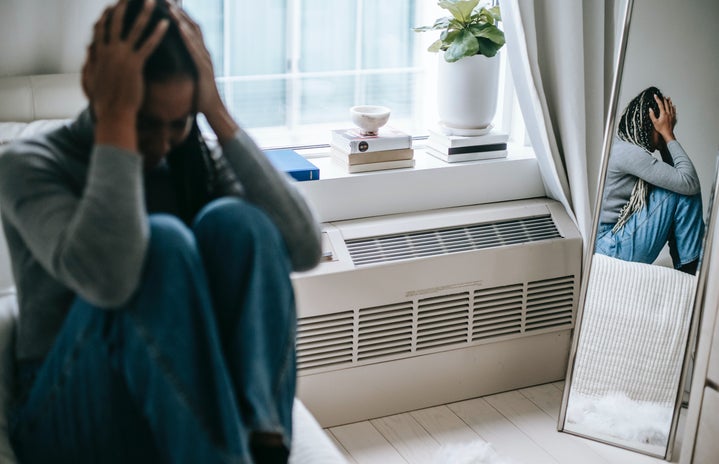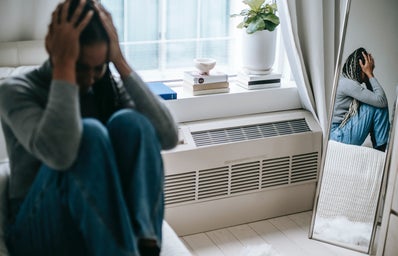TRIGGER WARNINGS: This articles delves into topics like depression, disordered eating, and neglect. Please do not read if these may be triggering topics for you. Remember that you are deserving of love; please reach out to someone if you are dealing with anything heavy. <3
The pandemic has taken a toll on us all for the past two years. It sometimes feel as if we haven’t felt peace since 2019, constantly having our mental and physical health hacked at by by stress, fear, and anger. Through it all, we’ve experienced a bunch of different symptoms that come from the stress of experiencing a pandemic—like depression, exhaustion, muscle and joint pain, as well as something that I’ve had to experience recently: hair loss.
My hair loss came as a result of the stress that I’ve experienced so far during the pandemic. I had gone through some personal difficulties during the beginning of the pandemic that had made isolation initially so much heavier and more difficult to deal with. With that came a wave of depression that took everything out of me for the next two years. I feel like in conversations people tend to focus on the main outcomes of depression, which deal with the mental side effects (like a decrease in happiness, difficulty finding pleasure in the things you used to, mental fog, etc.). Through my experience I’ve learned that all of this has proven to be true, but long-term depression can really take a toll on your hair, too.
My battle with depression made self care extremely difficult near impossible. What I mean by self care doesn’t include face masks and baths (though I do love those too), but instead the things you do to take care of your body, like sleeping, eating well, and managing stress. Taking care of myself didn’t seem to work anymore; I felt like I just wasn’t working anymore. When I tried to eat, I barely had an appetite; food seemed unappealing to me, and the idea of nourishing myself felt like a sin. When I tried to sleep, my mind was only filled with hatred and anger towards myself, making my nights long and restless. On top of all of this, exercise and any stress management felt pointless as I barely had enough energy to muster up the will to move around. I felt like I was drowning in stress and could not get away from it in any way. Social media and the news were filled with things that just added on to my list of things to worry about; I felt like I couldn’t escape the stress.
About half a year later, I began to notice more and more of my hair clogging the drain when I showered and more hair falling out when I brushed my hair. At first I kind of shrugged it off, thinking it was probably nothing and my mind was just exaggerating. Over time, my hair loss became more and more obvious, to the point that it couldn’t be ignored anymore. I was finding hair everywhere—any places where I would sit or any rooms I occupied were littered with my brown strands—and when I showered, my hair clogged the drain. I noticed that when I pulled my hair back or tried to pin it up, there were sparse areas where my scalp had become visible, and my already fine hair continued to feel increasingly thin.
I had never felt more embarrassed in my life. I feel like society pushes this notion that women’s hair is strongly tied to our identity, and losing it made me feel less feminine, less like myself. I felt like literally and metaphorically I was losing parts of myself. I began deep diving online for every possible remedy to hair loss; I did rice water treatments and invested in all sorts of expensive hair products—none of which helped my issue. It wasn’t until I had started doing better mentally that I realized what was actually the culprit of my hair loss.
At one point during the pandemic I had started seeing a therapist to help with my anxiety and depression. It took quite a while for me to open up and feel comfortable with the idea of recovery, but after about a year of therapy I started seeing pretty big improvements in my mental health. I opened up to my family about some of my struggles and began to slowly implement a bit more love into myself and my life. I had even brought up my feelings of embarrassment and shame, regarding my hair loss, to my therapist. I started to understand that my hair loss was a result of the stress and depression, and not just an issue relating to the treatments I was implementing.
I realized that I was never going to be able to grow my hair back unless I focused on the root of the issue: my nutrition. The stress that I had initially dealt with was something I couldn’t go back and change, but my struggle with eating was what I needed to focus on, because unless we eat enough and give our bodies enough nourishment, we cannot grow healthy hair. I took the time to look at my eating habits and determine how I could improve them. While doing this, I realized I was barely taking in enough food to properly function, let alone enough to grow my hair back. At first I slowly tried to incorporate more meals into my diet, regardless if they were deemed “healthy” or not, all that mattered was that I ate. So when I felt like I wanted to eat something or when I felt tempted to eat something, I was able to go ahead and eat it, even if it felt like I couldn’t.
I’ll have to disclaim that a huge factor that helped improve my relationship with food was therapy. In being able to work through my depression and my self hatred, I was able to get to a point where I felt love instead of anger towards myself, which allowed me to accept and feel worthy of eating. Over time, as I continued eating more and continued with therapy, my appetite grew. On days when my depression was especially tough, and I felt as though I couldn’t get up, I would keep some granola bars and crackers in my room to chew on, and made sure to try and drink some water. Often, I would shamefully ask my mum if she could help me make something, and she always would; this often helped me when I was in really deep depressive ruts. You know how sometimes food made by others or food at others houses seems to taste better? Sometimes that’s true, and allowing myself to ask people for help, no matter how embarrassing, was also a huge step in trying to heal. It allowed me to rely on others and feel like I was worthy of getting help, and I realized that I wasn’t burdening anyone.
I’m happy to say that my relationship with my food continues to improve, despite difficulties and setbacks that I still run into as I try to deal with my depression. On the bright side, I’ve started to notice a ton of tiny little hairs that stick out like sprouts growing back on the top of my head, and I’ve even had hairdressers comment on how many baby hairs I have coming in. I know that it’ll take a while until it all grows back, and I’ve come to terms with this. I’ll continue to work on healing my relationships with food and on healing my depression, no matter how long it takes. Even with sparse areas in my hair, even with insecurities, even with depression, I’m still human and I’m still deserving of love and care. So are you.


